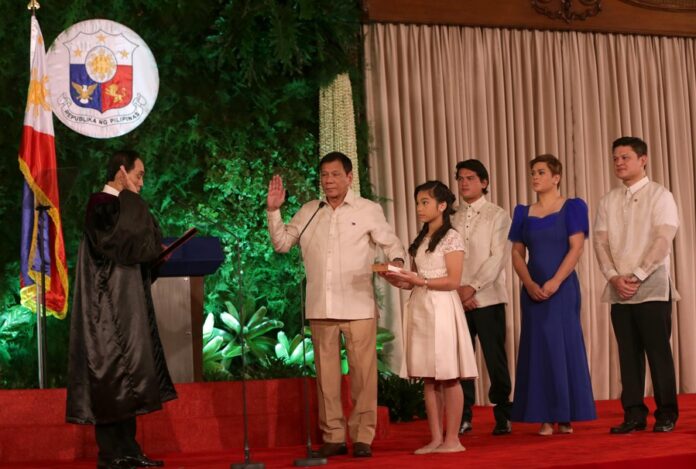Rodrigo Duterte was inaugurated as the 16th President of the Philippines on June 30, following a landslide election victory.
The controversial former mayor of Davao City, 71, promised a “bloody war” on crime and corruption during the election campaign.
Nicknamed “Punisher”, he is credited with a dramatic reduction in crime in the city.
He has also promised to end corruption and spread wealth around the country.
Duterte, who has barely left the Davao in the south since his election win, took his oath at the Malacanang Palace in Manila, in front of about 600 guests.
Duterte was sworn in by Supreme Court Associate Justice Bienvenido Reyes, with his left hand placed on top of the Bible held by his youngest daughter, Veronica.
The oath-taking was witnessed by Duterte’s children, Paolo, Sarah, and Sebastian.
Among the guests present during the ceremony were former Presidents Fidel V. Ramos and Joseph Ejercito Estrada.
Philippine Vice President Leni Robredo was sworn in at her inauguration ceremony in Quezon City.
It was the first time the two swearing-in ceremonies have being held separately.
During 22 years as mayor of Davao, Duterte built a reputation for blunt speaking and for supporting the extrajudicial killing of suspected criminals.
Crime rates fell dramatically but human rights groups estimate that more than 1,000 people were killed with no legal process. Many were executed by shadowy death squads.
On the international front, despite having bombastically promised to drive a jet-ski to a contested island in the South China Sea, relations between the Philippines and China could be about to improve.
Duterte has indicated that despite differences, and an upcoming ruling from the Permanent Court of Arbitration, he is ready for a more pragmatic, development focused relationship with the Chinese.
In the few weeks since Duterte’s landslide election victory, there has been a jump in the number of suspected drug dealers shot dead by police and anonymous vigilantes across the country.
As well as taming crime, voters will be looking to Duterte to fix the country’s infrastructure, create jobs and lift more than a quarter of the 100 million population out of poverty.
But he has also said he will continue his predecessor’s economic policies, which focused on infrastructure and fiscal efficiency, to push growth up to 7-8 percent, and analysts say they are encouraged that he plans to delegate this to experienced hands.
Duterte is the first president to come from the country’s volatile south in Mindanao.
Duterte replaces Benigno “Noynoy” Aquino III as president of the Philippines.



